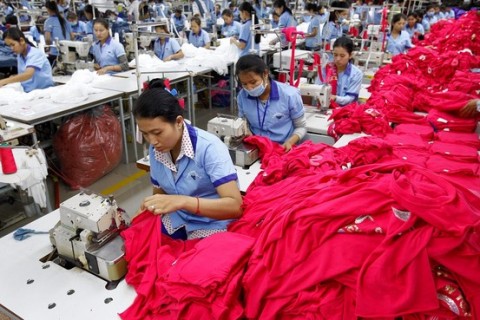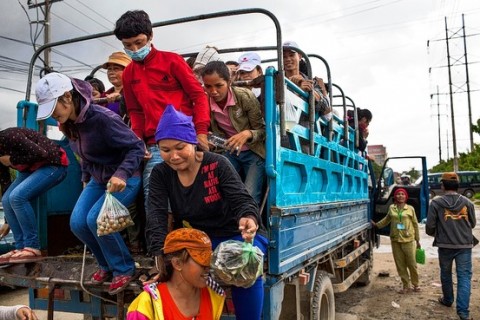Even though championed by many people as the representative model for the improvement of international labor standard, Better Factories Cambodia has recently come under pressure and criticism from both the Cambodian government and the factory association when the group decided to introduce an extensive initiative to improve garment workers’ conditions. This dilemma comes as the authority argues that tougher supervision will force businesses out of Cambodia and into less-regulated neighboring countries. This is clearly an existing paradox that any country must solve. If you were the Prime Minister or President of Cambodia? What should you do?
Boston Global Forum will work on these propositions in the coming month and will convene for another round of discussions in October 2013. If you wish to join our conversation or participate in our meetings, please send in your request to our Editor-in-Chief, Mr Nguyen Anh Tuan at [email protected]
The original story was reported by Kate O’Keeffe of the Wall Street Journal.
Cambodian Garment Factories Come Under Scrutiny
U.N.-Backed Group to Publicize Safety Failings Over Government Objection
A monitoring group backed by the United Nations said it would begin to publicize garment factories’ compliance with worker rights and safety standards in Cambodia, a controversial program that its organizers say will be the world’s most extensive initiative to improve working conditions at plants.
 Photo: European Pressphoto Agency
Photo: European Pressphoto Agency
A group plans to publicize compliance with worker rights at garment factories. Above, a Cambodia facility.
Accidents also have occurred in Cambodia recently, including two at factories in May, one of which left two people dead.
But Cambodia’s government and the country’s factory association have opposed the new program, saying it could wind up shaming only some factory owners and driving business to other countries where oversight is less rigorous.
The Better Factories program, set up by the U.N. and other groups a dozen years ago to improve conditions in Cambodia’s garment trade, is trying to reassert itself after coming under fire from some worker advocacy groups for not doing enough to improve factory conditions. Better Factories, among other things, inspects manufacturing facilities for problems such as child labor and unsafe conditions and offers training for factories to upgrade but has no enforcement power.

Jill Tucker, Better Factories Cambodia’s chief technical adviser, said she hoped that the new push to publicize compliance with worker rights and other standards not only will improve factory conditions in the Southeast Asian nation, but also will pressure people in the garment industry in other countries.
Getting support for the plan from all of Better Factories’ financial backers—which include the Cambodian government, the garment manufacturers’ association, unions, international buyers and foreign governments, such as the U.S.—has been a challenge, Ms. Tucker said.
Sat Samoth, undersecretary of state at Cambodia’s Labor Ministry, said the disclosure plan would violate a memorandum of understanding between the government and the U.N. International Labour Organization.
And the plan won’t help workers, Mr. Sat said. “If we disclose the names of the factories, and then the buyers stop purchasing the products, what will happen to the workers? They will lose their jobs,” he said. The government punishes factories that break the country’s labor laws.
Ken Loo, secretary-general of the Garment Manufacturers Association in Cambodia, called the Better Factories plan an example of “vigilante justice” and said that any change at factories has to be “demand-driven.”
“Consumers talk, talk, talk. But at the end of the day, they just buy the cheapest thing on the shelf,” he said.
The Garment Manufacturers Association in Cambodia called the plan ‘vigilante justice.’ Above, workers leave a truck at the end of a workday in the country.
Starting this January, Ms. Tucker said, Better Factories plans to release information on a new website about the performance of all factories it has inspected at least twice regarding 21 issues, such as wages, worker rights, fire safety and treatment of unions.
Currently Better Factories Cambodia submits confidential reports to factories, whose business partners have the option to buy them. It also publishes public summaries that don’t name plants.
Under the new program, factories that have had three or more Better Factories inspections and still fall two standard deviations below the mean for compliance will be subject to an even higher level of disclosure. About 15 of the 450 factories the program monitors currently would fit that description. The public will see how they measure up against 53 legal requirements.
During the first year of the initiative, factories will get one opportunity to resolve any violations before they are disclosed. From then on, their performance will be published without negotiation.
Wal-Mart Stores Inc. the world’s largest retailer by sales, applauded Better Factories Cambodia’s plan. “We know that transparency is vital to make progress in improving factory conditions throughout the global supply chain, and can only be accomplished by working with stakeholders across the industry,” it said.
Sweden-based H&M Hennes & Mauritz AB also expressed support for the plan and said it wouldn’t lead the retailer to abandon any potentially problematic plants without good reason.
“H&M is aware of the challenges the factories in Cambodia face,” said spokeswoman Andrea Roos. The company doesn’t immediately stop working with factories if problems are detected, she said. As long as factories take negative findings seriously and commit to resolving issues, H&M prefers to maintain long-term relationships with them, Ms. Roos said.
Kong Athit, vice president of the Coalition of Cambodian Apparel Workers’ Democratic Union, said the Better Factories initiative would give the union more ammunition to pressure brands to force their factory partners to improve conditions.
Created a dozen years ago, the Better Factories program in Cambodia initially had a powerful weapon to encourage factories to improve: Under a 1999 trade deal, the U.S. offered to expand access to its market, which had quotas on garment imports, if Cambodian companies improved labor standards.
The 2005 expiration of the quota system left the Better Factories program without much leverage to pressure factories. It also enabled manufacturers to campaign successfully for Better Factories to stop naming them in their public reports, which, the companies said, could hurt their business, said Sandra Polaski, a deputy director general of the U.N. International Labour Organization.
Mr. Loo, of the manufacturers’ association, said the factories weren’t powerful enough to have forced the program into making the change.
Ms. Polaski and Ms. Tucker said the decision was a bad one that eroded the program’s progress in the country.
The ILO now is pushing for greater transparency in all of its monitoring programs globally. The organization’s Better Work Haiti program publicly discloses key portions of its factory audits, though the garment industry there is quite small.
In Bangladesh, following the Rana Plaza disaster, a consortium of more than 80 brands signed a fire and building-safety accord, which will publicly disclose factory performance.
David Welsh, Cambodia program director for the Solidarity Center, a nongovernmental organization affiliated with the U.S.-based AFL-CIO labor group, said that if any stakeholder in Cambodia doesn’t get on board with the new Better Factories proposal, “it’s a de facto admission that they either can’t or won’t monitor what’s going on in their factories and an admission that presumably, they suspect what’s going on doesn’t meet international labor standards.”
